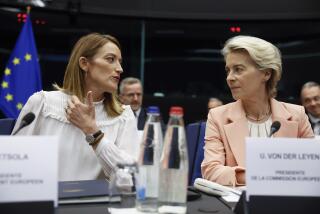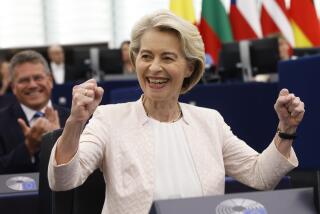EU Picks Chief; Critics Call Low-Profile Choice a Blow to Integration
- Share via
BRUSSELS — Leaders of the 12-member European Union ended an embarrassing impasse Friday by selecting an uninspiring minor political figure as the next president of the union’s powerful executive commission.
Their choice of Luxembourg Prime Minister Jacques Santer, 57, who has made almost no impact during his decade as leader of the EU’s smallest member country, was greeted with a mixture of dismay and disbelief by advocates of stronger European integration.
If confirmed as expected next week by the European Parliament in Strasbourg, France, Santer will succeed Jacques Delors, whose second five-year term expires at the end of this year.
Some feared that Santer’s appointment would only encourage a challenge to commission power that has become increasingly visible from member states during the past year.
“It’s the confirmation of our worst fears that Bonn, Paris and London want to cut back the power of the commission,” said Stanley Crossick, chairman of the Brussels-based Belmont European Policy Center. “That’s what’s most disturbing.”
Fernand Hermann, a Belgian member of the European Parliament from Santer’s own Christian Democratic Party, added, “He’s not the candidate of our dreams.”
Reaction, which came earlier in the week as Santer’s name first surfaced in speculative press reports, was so negative that those involved in the decision coupled the nomination with a plea to reserve judgment.
“I hope he’ll be given a fair chance of showing what he’s capable of doing,” said German Chancellor Helmut Kohl, who introduced Santer at a news conference here following the summit meeting. “We need someone who can bring reasonable compromise. Jacques Santer is the right man at the right moment.”
At the same news conference, Santer echoed Kohl’s plea, saying: “You have to judge me once I actually do something, not before. I’m fully committed to building the future of Europe.”
Santer was a participant in several key events in recent years, including the 1985 summit that committed the 12 nations to the single market and the historic 1991 meeting in the Dutch city of Maastricht, where the leaders pledged themselves to the goal of full economic and political union. But he appears to have contributed little that anyone can recall to these occasions, nor does he seem to have made a mark in any other field beyond the borders of his tiny Grand Duchy.
The reaction to Santer’s appointment is in many ways a reflection of Delors’ own stature and the high expectations he has created for the job. During his tenure, Delors breathed new life into the flagging EU, launching such revolutionary ideas as a European monetary union and transforming the member nations into a border-free, single, unified market for goods and services--a task largely completed at the end of 1992.
In the process, he built the office of EU commission president into one of the most powerful in Europe.
But it apparently was too powerful for the union’s 12 national leaders, most of whom seemed more intent on taming the commission’s challenge to their own power than in furthering the cause of European integration. Indeed, Santer’s main qualification for the job seemed to be that he is unlikely either to pose a threat to those who chose him or to add significantly to the executive commission’s influence.
As such, his was the classic choice by “a smoke-filled room.” The result is expected to further fuel the controversy about the lack of democratic involvement in filling the job some have come to call “president of Europe.”
Because Germany now holds the rotating six-month EU presidency, the choice of Santer effectively was made by Kohl, who quickly sounded out the other 11 heads of government before Friday’s emergency summit.
That meeting came exactly three weeks after the 12 failed to agree on a candidate at a routine summit on the Greek island of Corfu. There, British Prime Minister John Major vetoed Belgian Prime Minister Jean-Luc Dehaene, who was heavily promoted by France and Germany.
Other, potentially more powerful, candidates--including Dutch Prime Minister Ruud Lubbers, Spanish Prime Minister Felipe Gonzalez and the EU’s energetic trade commissioner, Leon Brittan--also proved unacceptable.
Santer’s appointment is especially significant because his five-year tenure spans a crucial period for the union. It faces a de facto constitutional convention in 1996 when the Maastricht Treaty on political and economic union comes under review. New initiatives to resolve Western Europe’s severe unemployment problem and the task of integrating the former Communist democracies of Central and Eastern Europe into the union are also considered vital for the region’s future.
The commission wields considerable power, largely because it enjoys a monopoly in proposing EU-level legislation and directives--a function it carries out with the aid of 15,000 civil servants.
Isabelle Maelcamp of The Times’ Brussels Bureau contributed to this report.
More to Read
Sign up for Essential California
The most important California stories and recommendations in your inbox every morning.
You may occasionally receive promotional content from the Los Angeles Times.













